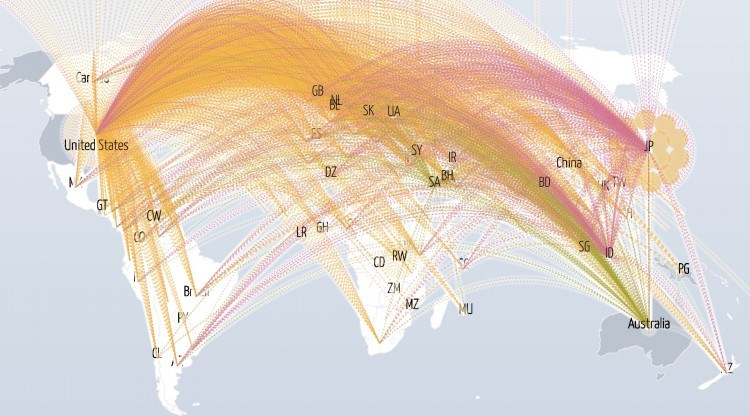Cybersecurity information that B.C.’s government won’t make public was shared by the province’s chief information security officer at an open May 2018 event at the University of British Columbia, sponsored by Chinese telecommunications giant Huawei.
Recently released but partially redacted documents show Gary Perkins, provincial chief information security officer and executive director of B.C.’s Information Security Branch, gave a presentation entitled ‘Information Security and Privacy’ to the summit.
Most of Perkin’s presentation slides were about media reports, cybercrime costs, alleged Russian interference in U.S. 2016 elections, activist hackers and critical infrastructure susceptible to cyberattacks.
One slide quotes the head of the FBI and a White House cybersecurity and cyberterrorism advisor saying China has been responsible for most attacks.
More than 170 people with no security vetting attended the presentation, sections of which were redacted as harmful to law enforcement when requested under access to information laws.
In a statement to Glacier Media, the Ministry of Citizens’ Services said information redacted included a list of internet protocol addresses, numbers assigned to each device connected to a computer network, and a list of global jurisdictions frequently the source of cyberattack attempts.
While a list of attack sources was removed, what remained were references to interactive websites such as Norse or Digital Attack Map, which clearly show such sources.

Global cyber attacks on the day of the conference. Source: Digital Attack Map
The ministry said the redactions were made under a Freedom of Information and Privacy Protection Act provision prohibiting disclosure that could harm effectiveness of investigative techniques.
“Severing on all FOI requests is applied by professional public servants,” the statement said.
Huawei remains in the news as chief financial officer Meng Wanzhou remains on bail in Vancouver as a process to possibly extradite her to the U.S. continues to unfold.
As well, Huawei is under the spotlight as countries seek to ban it from participating in fifth generation (5G) wireless networks serving everything from autonomous vehicles to smartphones. Some states have already banned Huawei products, fearing transfer of information to Chinese intelligence agencies.
Perkins, who’s responsible for provincial government cybersecurity services, was invited to speak at the conference by UBC electrical and computer engineering professor Konstantin Beznosov.
Released emails show Perkins suggested covering cybersecurity threats, critical infrastructure, cyberthreat incident response and the role of government in cybersecurity.
Beznosov said the conference was public and anyone was welcome to attend. He said all presentations were assumed to be of findings “already published in public venues or were intended to be published at such venues.”
“As such, no special security measures or security screening took place. The organization of the summit was in line with the format and openness of other cybersecurity research conferences and workshops,” the professor said.
All the presentations were assumed to report findings that were either already published in public venues or were intended to be published at such venues,” Beznosov said
Perkins made a similar presentation open to Simon Fraser University students, faculty and staff in January. Perkins did not respond to a request for comment nor did the government make him available.
Canadian Universities
Multiple Canadian universities – including two in B.C. – are using computing services or accepting money from Huawei despite repeated academic discussion papers produced under Canadian Security and Intelligence Service (CSIS) auspices warning Chinese companies may be involved in state-sponsored cyberespionage.
“Beijing will use its commercial position to gain access to businesses, technologies and infrastructure that can be exploited for intelligence objectives, or to potentially compromise a partner’s security,” said a May 2018 academic outreach report.
China’s 2017 National Intelligence Law says organisations must “support, co-operate with and collaborate in national intelligence work.”
The issue of Chinese expansion of so-called soft power – as opposed to military hard power – has been subject of the CSIS materials for almost a decade.
By 2016, a report was specifically mentioning Huawei.
“CSIS has seen a trend of state-sponsored espionage in fields that are crucial to Canada’s ability to build and sustain a prosperous, knowledge-based economy,” CSIS director David Vigneault told the Economic Club of Canada in December. I’m talking about areas such as A.I., quantum technology, 5G, biopharma, and clean tech. In other words, the foundation of Canada’s future economic growth.”
Despite these warnings, Canadian universities such as the University of British Columbia, the University of Toronto and Simon Fraser University accepted millions from Huawei or spent millions with the company.
UBC received $3 million from Huawei in October 2017 for research and development and communications research, on top of earlier donations, for computing work in the science and engineering faculties.
UBC said Huawei would invest over $10 million in Canadian universities’ research in 2017.
Other conference sponsors were Natural Sciences and Engineering Research Council of Canada and Scotiabank.




